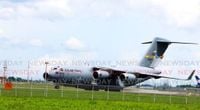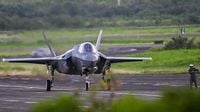On October 9, 2025, a swirl of intrigue and speculation swept across the Caribbean as news broke of a United States Air Force C17 aircraft landing at Trinidad and Tobago’s Piarco International Airport. Social media lit up with rumors, with many users convinced that the US military was setting up shop in Trinidad for a new offensive against neighboring Venezuela. Photos of the hulking aircraft circulated online, fueling anxieties and accusations that the Trinidadian government was allowing foreign forces to operate on its soil, potentially damaging its reputation and regional relationships.
But according to Newsday, the reality was far less dramatic. The US Embassy in Port of Spain quickly clarified that the aircraft’s presence was purely humanitarian: it had arrived to repatriate the body of a US embassy official who had died on October 2. An embassy spokesperson explained, “The US Embassy confirms that a US military aircraft landed at Piarco International Airport on October 9 to repatriate the remains of our embassy colleague who passed away last week. We remain deeply grateful for the caring support of the government and people of Trinidad and Tobago, especially at this difficult time.” After several hours on the runway, the plane departed, bringing a respectful close to an episode that had triggered outsized fears.
This incident, however, unfolded against a tense backdrop of geopolitical maneuvering and regional unease. Just hours after the C17’s visit, Grenada’s Foreign Affairs Ministry confirmed that the United States had formally requested permission to temporarily install radar equipment and technical personnel at the Maurice Bishop International Airport. The government’s statement, reported by Guardian Media, emphasized that any decision would be “guided by Grenada’s sovereignty, public safety, and national interest, including the protection of our tourism industry, the traveling public, and the country’s economic well-being.” The ministries of national security, legal affairs, and foreign affairs were coordinating with the airports authority and other relevant agencies to review the request's technical and legal implications.
This US request has reignited sensitive memories in the region, especially considering Grenada’s history. The island nation, just about 100 miles from Venezuela, was the site of a US-led military intervention in 1983—an event that remains vivid in regional consciousness. With Washington amassing naval and air assets near the Venezuelan coast, allegedly to combat narcotics smuggling and other illicit activities, speculation has mounted that the US might be eyeing Grenada as a strategic base for future operations. The Grenadian government, led by Prime Minister Dickon Mitchell, has sought to reassure its citizens that “decisions will be made only after all technical and legal assessments are completed,” and promised ongoing transparency as the situation develops.
Yet, the broader implications for the Caribbean Community (Caricom) are hard to ignore. International consultant and former Jamaican ambassador Curtis Ward spoke bluntly to Guardian Media, warning that Trinidad and Tobago’s Prime Minister Kamla Persad-Bissessar’s decision to welcome US forces marks a significant departure from Caricom’s long-standing Zone of Peace policy. “We have to recognize that T&T’s Prime Minister has broken with Caricom’s traditional Zone of Peace by inviting and welcoming the US to stage military forces in Trinidad. The little unity that may have remained is already shattered by Trinidad and Tobago,” Ward asserted. While he acknowledged it was too early to determine Washington’s precise intentions, he cautioned that these moves could deepen existing fractures within the regional bloc and have far-reaching consequences for Caribbean stability.
Ward also questioned the strategic necessity of a US base in Grenada, arguing that the United States already enjoys robust naval and air capabilities throughout the region, not least in Trinidad and Tobago itself. “Basing in Grenada wouldn’t add much advantage if the US can already base in Trinidad,” he noted. He pointed to renewed US pressure on Venezuela—especially under President Trump, who is reportedly determined to pursue regime change in Caracas after previous failures—as a possible explanation for Washington’s interest in Grenada. Ward also referenced mounting tensions with Colombia, highlighting a recent dispute over a vessel allegedly destroyed by US forces, and alluded to Guyana’s existing security agreement with the US and Jamaica’s relative silence on the matter. “Given the current Jamaican government’s approach of not doing anything, the US could interpret it as being out of step with its policy. I don’t expect much from Jamaica on this issue,” he added.
Regional security expert Dr. Garvin Heerah offered a nuanced perspective, stressing that while Grenada has every sovereign right to make its own security decisions, such arrangements must be balanced against Caricom’s collective commitment to neutrality and non-alignment. “Grenada, as a sovereign state, reserves the right to engage in bilateral agreements that advance its national interests,” Dr. Heerah told Guardian Media. “However, such arrangements must also be weighed against Caricom’s collective diplomatic posture and its long-standing commitment to neutrality and non-alignment.” He warned that if the reports of US radar installation proved accurate, they could test Caricom’s unity and disrupt the region’s security balance. Drawing on the painful memory of the 1983 intervention, Dr. Heerah insisted that any contemporary military or logistical arrangement must be managed transparently and diplomatically to avoid misinterpretation. “The memory of the 1983 intervention remains etched in regional consciousness. Any contemporary military or logistical arrangement must therefore be managed transparently and diplomatically to prevent misinterpretation,” he cautioned.
Dr. Heerah further noted that the presence of foreign military assets, even if ostensibly for humanitarian or counter-narcotics purposes, could make Grenada a focal point during periods of heightened tension. He urged regional dialogue and consultation to ensure that any agreements align with Caricom’s peace and security frameworks. “While Grenada’s sovereign right must be respected, any move of this nature requires regional consultation, strategic foresight, and diplomatic prudence,” he said. “The Caribbean’s future depends on maintaining open communication, reaffirming non-alignment principles, and safeguarding our identity as a Zone of Peace.”
Professor Andy Knight, an international relations scholar at the University of Alberta, went even further in his warnings. In a widely shared post, he wrote, “This will be a huge mistake if Grenada complies with this request. If Grenada agrees to host foreign military assets on its soil, this will violate the collective regional principle that was agreed upon after the last disastrous Grenada invasion.” Knight called on Caribbean nations to reaffirm their commitment to peace and independence, arguing, “The true security of the small island states of the Caribbean does not come from foreign military bases or illegal gunboat diplomacy—it comes from good governance, social justice, sustainable development, and respect for international norms. The Caribbean should stand united in saying: our seas are not battlefields; our islands are not launching pads. We are a Zone of Peace, and we intend to remain so.” According to Knight, any partnership with the US should be rooted in mutual respect, trade, climate cooperation, and people-to-people ties, not “neo-colonial military dependency.”
As Grenada’s government weighs its options and Trinidad and Tobago continues to field criticism for its perceived openness to US military activity, the region faces a delicate balancing act. The decisions made in the coming weeks will not only shape the security landscape of the southern Caribbean but may also redefine the meaning of unity, sovereignty, and peace for Caricom’s member states. For now, the eyes of the Caribbean—and indeed, the world—remain fixed on Grenada, Trinidad, and their leaders’ next moves.


